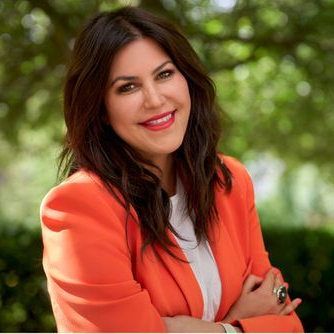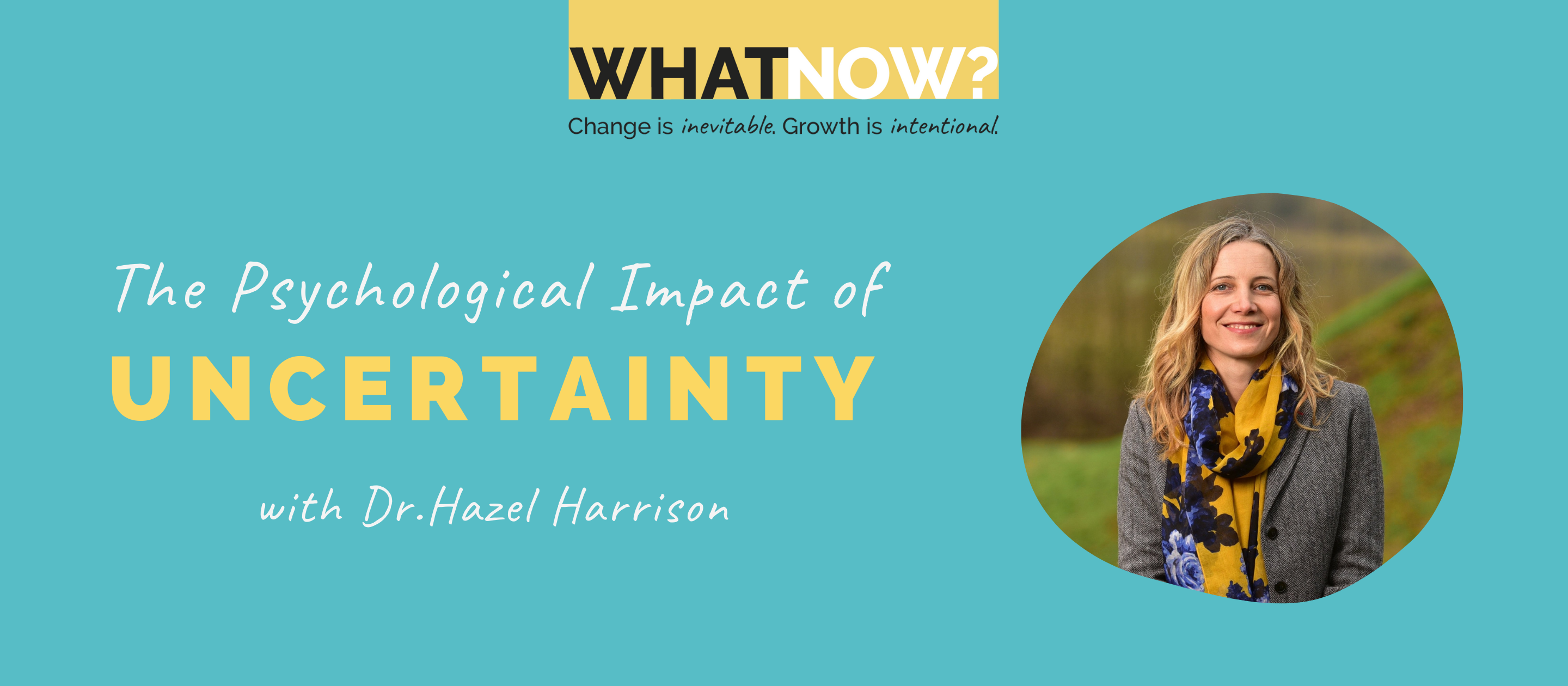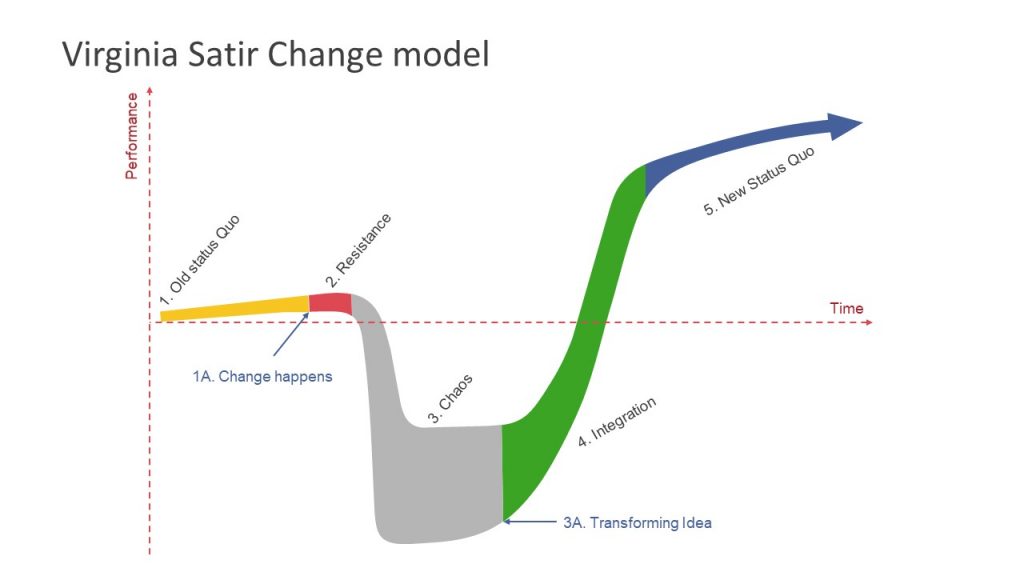The classic cliffhanger.
Done right, and it’s a very effective plot device. The uncertainty of not knowing ‘what happens next’ is both torturous and tantalising. It guarantees that we’ll tune in for the next episode,
so we can find out if Rachel got off the plane, and then move on with our lives.
The reason cliffhangers work is because humans crave certainty, we really don’t like being in the dark for too long. Good or bad, a decisive outcome is always better than just not knowing.
That’s why the last eight months have been so challenging – we’ve been suspended on a permanent cliffhanger, obsessing over what happens next. Psychologically, that’s bloody hard!
So I loved it when, at our recent What Now? event, clinical psychologist and award winning coach Dr. Hazel Harrison, guided us through the psychological impact of uncertainty, revealing how we can reframe our emotions, and convert them into catalysts for positive growth.
I was blown away, so based on her awesome advice, I’ve put together a blog post that acts as a toolkit for you and your organisations, enabling you to outwit and overcome the psychological impact of uncertainty, which will be paramount for you and your teams as you move forward.
The Psychological Impact of Uncertainty: The Journey we’ve been on.
Dr. Hazel pointed to Virginia Satir’s model of change to demonstrate how we went from the calm of what we knew pre-Covid to where we are now. Let’s take a quick look at where we’ve been:
- Status Quo –
Pre-Covid – remember that? When our only pandemic reference point was Kate Winslet in Contagion. The Status Quo phase was familiar, it felt consistent, we had things we could confidently invest our time and energy in. - Resistance
Suddenly this disruption came into our lives and we probably felt some resistance to that. Negative feelings emerged and we might have even started to blame others - Chaos It had always been a well-held assumption that you could go to a supermarket and buy toilet roll. But not anymore, suddenly everything was being challenged. We had to work from home, we couldn’t see our friends or our families, we might have lost a sense of belonging, connection and meaning. Not for everyone, but for many, an increase in uncertainty increased anxiety.
- Integration
Perhaps our anger and frustration shifts, and we start to see how we can integrate all this ‘new normness’ into our lives. In fact, a lot of us have used this as an opportunity to reflect on our old rituals, assessing what their meaning was, and which ones we want to pick up again. Meanwhile, we have (finally) taught our parents to unmute themselves on zoom, lunchtime strolls have fully replaced ‘al desko’ dining, and there’s a hint of predictability again. - New Status Quo
The new benefits have a certain glimmer, and we have identified what we want to harness and hold onto. So slowly we move out of that big dip, into a new place, and a new status quo. There’s excitement and possibility.
But then, last week our Status Quo became a bit wooly again, and it’s been one of the most exhausting and tiring challenges that we have faced. We are continually being asked to reinvent, whilst riding a rollercoaster that we seemingly have no control over.
But as Dr. Hazel said:
“When this began, I thought, “we have to be forgiving, we don’t know how to do this.” But maybe now we can say “we have done this before”…There are going to be peaks and troughs, but we can find consistency with how we move through this. And although we know there will be moments of chaos, there will be many moments of learning.”
As part of that learning, she suggested ways that we can manage this uncertainty, helping us to shift into a place of growth and change. Firstly, by understanding how we can manage stress, and secondly how we can learn to control the controllables.
BEFRIEND YOUR STRESS
Stress – you may have had a tricky relationship with it so far. But I’m going to ask you to kiss and make up with it, to hang out with it. It sounds impossible, but it’s a great catalyst for performance.
Our emotions are a powerful source of information. As humans we have evolved to have this awesome stress response, it floods our system with exciting, energising hormones that we can use to help us to perform well. We are so used to interpreting this response as a signal that something bad is happening that it can put us in an unhelpful state, rather than using it to trigger positive growth!
Acknowledge it!
The first step to transforming your response to stress is to simply “see” it. The acceptance itself works wonders in helping to shift your mindset.
Reframe it!
The way we think about stress really matters, so try and keep a positive attitude about it. A compelling large scale study identified that if we try and re-frame stress as motivating, positive and fueling productive problem-solving for the things we care about, we can use it to our advantage to fuel positive growth.
Weaponise it!
If you feel stress-laden, use that feeling as a motivating tool. It can be a weapon used to compel you into action!
Additionally, for those managing people, teams and organisations, get to know what happens in your team when they’re feeling stressed and anxious.Identify what it is that enables them to work through these times by thinking about these questions:
- How do they work through these challenges when they feel stressed?
- We might be apart, but we’re all all in this together. How can we tap back into this?
CONTROL THE CONTROLLABLES
Let go of the things that you can’t control, and instead make sense of, and take ownership over, the things that we can control. The chaos aspect is frightening, but even in chaos, there are things that will stay the same! From your favourite mug, to your lunchtime walk, to a scheduled morning zoom chat whilst we aren’t together.
Move your team away from the “What if?” by asking them “What is?”:
- What are the things you need to let go of?
- What do you have some control over, that you’re going to exercise control over?
Implementing these techniques should really help your team manage their response to any Q4 cliffhangers, and we’d love to hear how you get on!

more articles by Cate Murden


